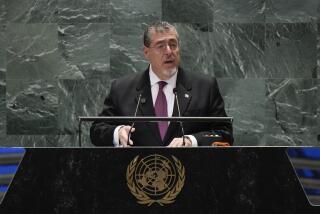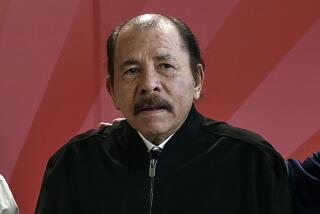U.N. to send legal team to aid Guatemala’s justice system
MEXICO CITY — United Nations and Guatemalan officials announced Friday the creation of an international team of investigators that will aid Guatemala’s beleaguered criminal justice system in its fight against organized crime.
The U.N.-staffed International Commission Against Impunity in Guatemala will consist of 150 lawyers and forensic investigators who will prosecute cases in local courts.
Nationalists have opposed the commission, saying it would violate Guatemala’s sovereignty. Guatemala’s Congress approved the creation of the commission in August.
Human rights groups and foreign diplomats argued that only outsiders could rescue the country’s police, prosecutors and judges, who are believed to be widely influenced by organized crime groups cash-rich with the profits of drug trafficking.
The killing of three Salvadoran legislators in Guatemala last year by members of an elite police unit heightened the sense that crime was out of control. A few days after the officers were arrested, they were slain in their jail cells.
Members of the United Nations commission will act as “complementary prosecutors” under Guatemalan law.
Carlos Castresana, a veteran prosecutor from Spain, heads the commission. In a telephone interview, Castresana said his mission would be to build strong cases, relying more heavily on scientific evidence.
The commission’s goal is to help strengthen local institutions in Guatemala, a country where it is widely believed that powerful “clandestine organizations” operate outside the law.
“Democracy is based on the principle that the weak and the strong, the rich and the poor, those in government and those outside of government, should all be equal in the eyes of the law,” Castresana said. “Sadly, that hasn’t been the reality in Guatemala.”
Guatemala’s president-elect, Alvaro Colom, who assumes office Monday, has declared his support for the commission.
“We have great hopes,” said Carmen Aida Ibarra of the Myrna Mack Foundation, a human rights group in Guatemala City. “But we’re also aware that, given the ungovernable nature of the country, there will be many challenges.”
The commission should target the web of money laundering that assists local mafias, Ibarra said, and “the dark groups that have penetrated the state . . . and political parties.”
Ibarra expects the targets of the U.N. commission’s prosecutors to pursue a legal strategy that would include court appeals seeking to declare the panel’s actions unconstitutional.
Castresana said he is prepared to meet such challenges. “It would be silly not to be ready for the adversaries’ next moves,” he said.
It is widely believed in Guatemala that the U.N. commission will take up the case of the slain legislators. Regional intelligence sources have said the killings are linked to a local trafficking group that ships illicit drugs between South America and Mexico.
Castresana said he could not comment on which cases his commission might take up.
The U.N. commission is being funded by a variety of international donors, including the World Bank, the European Commission, the United States and the Soros Foundation.
--
Special correspondent Alex Renderos in San Salvador contributed to this report.
More to Read
Sign up for Essential California
The most important California stories and recommendations in your inbox every morning.
You may occasionally receive promotional content from the Los Angeles Times.











